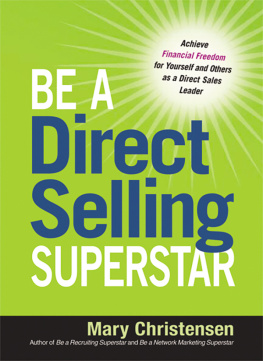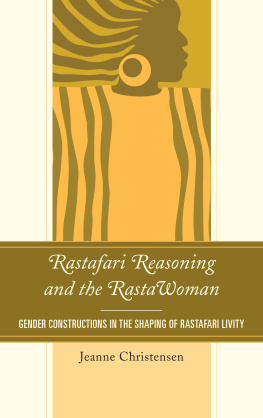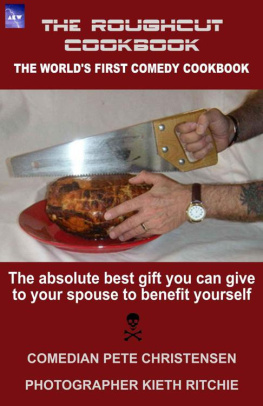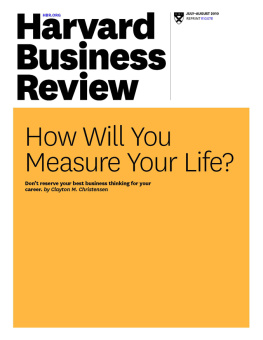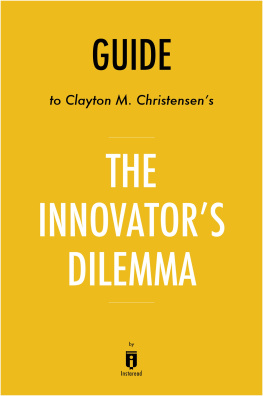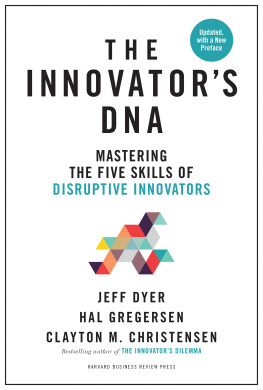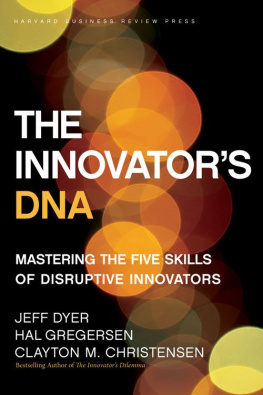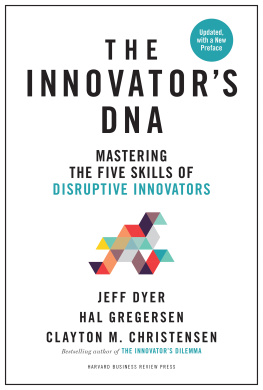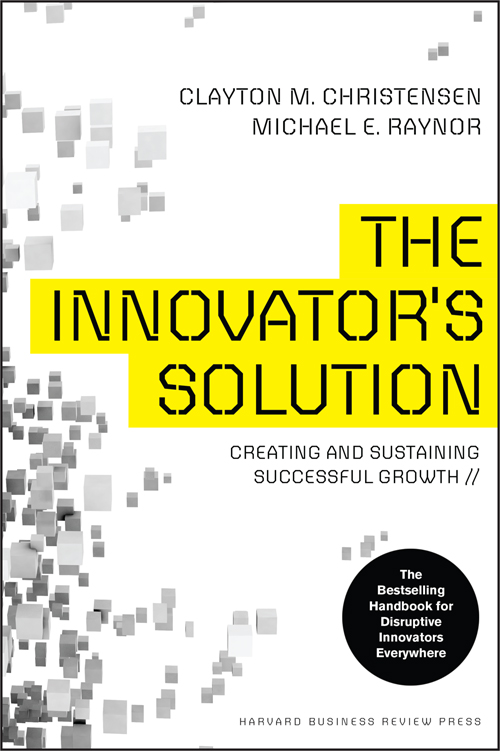No part of this publication may be reproduced, stored in or introduced into a retrieval system, or transmitted, in any form, or by any means (electronic, mechanical, photocopying, recording, or otherwise), without the prior permission of the publisher. Requests for permission should be directed to permissions@hbsp.harvard.edu, or mailed to Permissions, Harvard Business School Publishing, 60 Harvard Way, Boston, Massachusetts 02163.
I have spent much of the past decade puzzling over two questions. The first: It is easy to explain why poorly run companies fail; but many of historys most successful and best-run firms have lost their positions of leadership, too. Why is it so hard to sustain success? The Innovators Dilemma summarized what I learned about this puzzle. Its not just management mistakes that cause failure. Certain practices that are essential to a companys successlike catering to the needs of your best customers and focusing investments where profitability is most attractivecan cause failure too.
The second centered on the opportunity in the dilemma: If I wanted to start a company that could become significant and successful and ultimately topple the firms that now lead an industry, how could I do it? If indeed there are predictable reasons why businesses stumble, we might then help managers avoid those causes of failure and help them make decisions that predictably lead to successful growth. This is The Innovators Solution .
The challenge of this research quickly outstripped my abilities; and I have relied upon some extraordinary people to help me complete it. Michael Raynor, who has tutored me from the day he arrived as a doctoral student at Harvard, has been an exceptional colleague. To describe Michaels integrated grasp of arts, letters, philosophical discourse, and history as incisive would understate his intellect. Confident that I could expose and rectify the gaps in my evidence and logic by examining my rough ideas through the lenses of the varied academic disciplines that Michaels mind has mastered, I asked him to join me as coauthor. Michael has balanced this work with his duties as a husband, father, and director of research at Deloitte Consulting, all the while shuttling between Toronto and Boston. I deeply appreciate his selfless, humble, and persistent hammering to get these ideas shaped right. He has become a great friend.
Scott Anthony, Mark Johnson, and Matt Eyring each have forsaken or postponed far more lucrative careers to join me in this effort. As my primary research associate, Scott has managed our staff of researchers, written crucial case studies, helped me teach and explain complicated concepts, and reviewed and refined every draft of this book. Mark and Matt, through our firm Innosight, have translated these concepts into practical tools and processes to help managers build businesses that will be significant and successfuland in so doing have taught me how our findings can interface with managerial reality. My office manager, Christine Gaze, and research partners Sally Aaron, Mick Bass, Will Clark, Jeremy Dann, Tara Donovan, Taddy Hall, John Kenagy, Michael and Amy Overdorf, Nate Redmond, Erik Roth, and David Sundahl each have helped me stay atop the huge volume of interesting ideas, opportunities for inquiry and authorship, and requests for assistance that flow into and out of my office. They have painstakingly helped us get the data, logic, and language right for every purpose.
I have a profound debt to Harvard Business School and my colleagues here. The insightful research of Professors Clark Gilbert and Steve Spear has been exceptionally valuable. Other faculty, including Kent Bowen, Joseph Bower, Hank Chesbrough, Kim Clark, Tom Eisenmann, Lee Fleming, Frances Frei, Alan MacCormack, Gary Pisano, Richard Rosenbloom, Bill Sahlman, Don Sull, Richard Tedlow, Stefan Thomke, Michael Tushman, and Steve Wheelwright have also shaped what we have come to understandas have Professors Rebecca Henderson, Paul Carlile, James Utterback, and Eric von Hippel of MIT, Robert Burgelman of Stanford, and Stuart Hart of UNC. The extraordinary benefit of Harvards case method of teaching is that the teachers can carry issues they dont understand into the classroom, ask questions of the students in the context of a case, and then listen to and learn from some of the brightest people in the world. I express my love and my gratitude to my students for preparing so hard every day to teach each other and their teacher in so many ways. It is a learning system without parallel.
I also have sought the advice of some the most capable business thinkers and executives in the world. Matt Verlinden and Steve King of Integral, Geoffrey Moore of the Chasm Group, Tony Ulwick of Strategyn, Crawford del Prete of IDC, Andy Grove of Intel, Ken Dobler of Johnson & Johnson, Dan Carp and Willy Shih of Kodak, Dennis Hunter of Applied Materials, Michael Putz of Cisco, Chris Rowen of Tensilica, Bill George of Medtronic, Meir Weinstein of EMC, Michael Packer and Kelly Martin of Merrill Lynch, Mark Ross of Cypress Semiconductor, and Ron Dollens, Ginger Graham, and Rod Nash of Guidant have all tutored me.
I owe the deepest debt to my family. My children, Matthew, Ann, Michael, Spencer, and Katie, each have discussed, used, and bettered my understanding through their own work and schooling. My wife, Christine, is the smartest person I have known. Her standards for clarity and completeness are uncompromising, and her language and intellect are imprinted on every concept in this bookwhich is remarkable, given that much of her advice came at the end of long days that were filled with the pressures of motherhood and her selfless service to others. She brings love and light to me and everyone she meets, every day.
Academia for some can be an enterprise of solitary pursuits. I am blessed in contrast to work within a community of selfless, humble, smart, and intellectually courageous men and women who as a group have made the substantial progress that is summarized in this book. I am grateful to have been able to play my role in this effort.
Clayton M. Christensen
Boston, Massachusetts
Like Clayton, I offer my thanks to the many people who have shared their experiences and talents with us. Without their willingness to be part of our learning processes, neither this book nor our respective careers would be possible.
The latitude I have enjoyed within Deloitte Research is, as far as I know, unparalleled in the consulting industry. The firm has gone beyond simply tolerating my idiosyncratic undertakingsof which this book is certainly oneto actively encouraging them, making possible the exploration of a different way to create and share knowledge. I am especially grateful to Ann Baxter, the head of Deloitte Research, and Larry Scott, global leader of Deloitte Consultings Strategy and Operations practice, for making it possible for the ball to start rolling, and to innumerable others in Deloitte Consulting and Deloitte & Touche for their enthusiasm and support that has maintained and accelerated that momentum.



